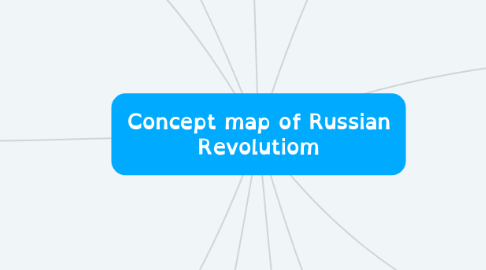Concept map of Russian Revolutiom
Soham Yadavにより

1. Rise of Socialism in Europe and effect in Russia.
1.1. Europe was going through industrialisation and the rise of socialism in Europe was there.
1.2. Effect of Europe's mindset was seen Russia as well.
1.3. The above views were supported by Robert Owen, Louis Blanc, Karl Marx, Friedrich Engels.
1.4. Formation of Second International. And in Germany Social Democratic Party(SDP).
2. Russian Society
2.1. Liberals Wanted Society to follow equality but no voting rights for all and wanted parliamentry government, to safe guard the interest of the people.
2.2. Radicals They supported women's rights and wanted a nation in which the government was based on the majority of the country's population. They were not against the existence of private property.
2.3. Conservatives They opposed the views of both Radicals and Liberals. In the eighteenth century conservatives had been generally opposed to the idea of change. By the nineteenth century conservatives accepted that some change was necessary.
3. Socialism in Russia
3.1. All political parties were illegal in Russia before 1914.
3.2. Formation of Russian Social Democratic Workers Party in 1898 by the workers.
3.3. Formation of Socialist Revolutionary Party in 1900(they started struggling for peasant rights).
3.4. The Russian Socialist Democratic Party was divide into 2 mindsets - 1) Bolsheviks - They believed in disciplined
3.5. It was said that peasants but not workers would be the main source of the revolution.
4. The Struggle for CHANGE begins in Russia
4.1. Struggle for making Constitution
4.2. Struggle for changing working hours and Constitution.
4.3. Bloody Sunday -
4.4. Formation of consultative Parliament or Duma
5. First World War and the Russian Empire
5.1. The Tsar started taking decisions without the consulation with the Duma
5.2. St. Peterberg name was changed to Petrograd
5.3. Largew no. of casualities in the Eastern part in Russia
5.4. People in Russia started Riots for food because German cutoff the supplies on Baltic Sea.
5.5. February Revolution in 1917
5.6. Rise in no. of refugees
5.7. Rise of Vladimir Lenin(A Bolshevik leader) in April 1917
5.8. October Revolution in 1917
5.9. Bolshevik party took control over the country in november 1917
5.10. In March 1918 Bolshevik party took peace with germany
6. Russian Revolution and the Global Effect
6.1. In many countries Communist parties were formed
6.2. Russia became Union of Soviet Socialist Republic (USSR)
6.3. USSR was founded in 1922
6.4. By the break of Second World War Russia became a strong and a powerful country
7. Industries Society and social change
7.1. Indusrtialisation started and it resulted in large no. of people working in factories.
7.2. Long working hours
7.3. Poor wages
7.4. Unemployment was common
7.5. Peasants too were unhappy because they owned a very little land. Most of the land was owned by Nobility that is Tsar and the Orthodox Church.
7.6. The working conditions were bad and the living conditions were also bad.
7.7. Rise of Socialism(Property and Wealth to be owned by a worker) in Russia due to bad working conditions.
7.8. Workers and Peasant started forming political groups due to the above reason.
8. Rise of Socialism in Russia
8.1. The beginning of Russian Revolution with the beginning of October
9. Russia after the first World War
9.1. The Bolshevik party was renamed as the Russian Communist Party
9.2. Starting of Civil War in 1918 and !919 as the country was divided between greens (socialist revolutionaries) and Whites (Tsar supporters)
9.3. Bolshevik party won the struggle with the help of non Russian nationalities abd muslims
9.4. Lots of favours were given to these people
9.5. Bolsheviks brought many reforms (pg 42)
9.6. Rise of Stalin after the death of Lenin
10. Russia and Rule of Stalin
10.1. Collectivisation
10.2. Econimc crisis and Problems in Russia
11. By the End of twentieth Century the International reputation of USSR as a Socialist Country declined


